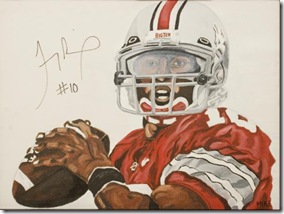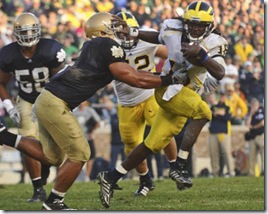troy smith


It's no Nuge but it's something. Also: Daily.
So it seems a lot of people, including you, I believe, have resisted the "Denard Robinson 2011 = Michael Vick 2010" path to blind hope for the upcoming football season. I'm as hopeful as anyone else because duh, but I'm also aware that Robinson is probably too small and inaccurate at this point in his development for this to be a realistic possibility.
But what about Troy Smith? I believe that kid was around Robinson's size, but probably a little slower and had an arm that was probably a bit more accurate but not quite as strong. Do you agree that Smith (against anyone other than Michigan, against which he was a planet-devouring demigod regardless of the season you want to talk about) is a realistic/optimistic benchmark we can have in mind when projecting Robinson in 2011?
This isn't to say Robinson will be as good as Smith, only that their skill sets are comparable, as are the coaching philosophies under which they operated, and that getting some mixed bag of 2005 and 2006 Troy Smith out of the QB position would be a positive.
-Anon
Troy Smith's career does give some hope that a hopeless n00b of a quarterback can develop into a lethal gunslinger. When Justin Zwick was injured midway through 2004 he was pressed into the lineup as redshirt sophomore and was somewhere between Sheridan and Forcier until he played Michigan. You don't need to be told he was insane against M: 18 rushes for 145 yards, 13 of 23 passing for 241 yards, three total touchdowns, no turnovers.
Without that game his numbers were turrible: 3.0 YPC, 6.6 YPA, 56% completion percentage. With it—and as much as we hate to admit it, that happened—his redshirt sophomore numbers were about on par with Tate Forcier as a freshman except with fewer turnovers. With the exception of TD-INT ratio, Denard was actually well ahead of him as a true sophomore, averaging almost nine yards per attempt and running for a billion yards at 6.6 yards a pop.
So if he can improve as much as Smith we're in business. The next year he blew up, completing 63% of his passes for 9.3 yards an attempt with 16 TDs and 4 INTs. He also rushed for around 600 yards on 12 carries a game.
Problem? Yes:
- Smith was handing off and throwing to Santonio Holmes (first round pick), Ted Ginn (first round pick), Antonio Pittman (fourth round pick), and Anthony Gonzalez (first round pick). You can see Stonum and Roundtree getting drafted but probably not until late; Smith had a ton more talent at his disposal than Robinson will.
- Smith had the same coaches for the duration of his career.
- Smith's improvement was standard deviations above the mean, so while it's an optimistic benchmark for Denard it's not one it's reasonable to expect he'll reach.
- Smith's running ability may have opened up some passing lanes for him but nowhere near as many as Robinson's did. If you're going to de-emphasize Robinson's legs that should make it tougher to pass and easier to run.
If Smith provides an optimistic benchmark for Robinson he also provides one for Michigan's coaches: as Smith developed Ohio State's offense gradually morphed into a passing spread reminiscent of Purdue at its absolute apex. This is generally out of character for Tressel—he only brings out the spread option for Pryor in times of great need—but as Smith developed he earned enough trust from his coaches for them to play to his strengths.
Have a question for you, Sir. This is all hypothetical but I was wondering what would you think at the end of it all?
April 2011 - Coach Hoke receives email concerning Player X selling comp tickets (nevermind everyone does it, it is still illegal), Coach Hoke emails back, says he'll check into it. Now...what does Coach Hoke do? What do you hope he does? Go to Compliance? Or handle it internally?
So, he decides to handle it internally
April 2011 - Coach Hoke asks player, player denies selling tickets.
April 2011 - Send email to parents of Player X reminding them that selling comp tickets is illegal.
April 2011 - Has meeting with team reminding that comp tickets can't be sold.
June 2011 - Sends email to person who sent first email verifying that Player X did indeed sell tickets (so, he doesn't get tickets for upcoming season)
Dec 2011 - Michigan Compliance Office gets documentation that Player X did indeed sell tickets.
Dec 2011 - Player X confesses to selling tickets...Michigan self-reports and recommends 5 games for the following season (since that is the normal recommended punishment for this type of violation and the fact that the player didn't come forward).
Dec 2011 - Coach Hoke signs document that no other information was available (giving him the benefit of the doubt, since he gets several hundred emails a day and the fact that he's gone through an entire football season)
Jan 2011 - Michigan Compliance office finds emails related to ticket incident while searching for something else.
Feb 2011 - Michigan Compliance Office interviews Coach Hoke and self-reports information. Recommends 2 games hoping that Player X's suspension is reduced.
March 2011 - Player X's suspension is upheld, Coach Hoke changes his suspension to match Player X.So, what should Michigan do with Coach Hoke? What do you want to happen to Coach Hoke if he got caught up in something he thought that he could handle internally?
I know it is all hypothetical in nature though Player X could be anyone and I imagine this event could easily come to pass, but everyday coaches make decisions, some good and some bad...but I would be interested in hearing what you would want to happen if this particular event were to go down that way.
Really enjoy your site even though I'm an Ohio State fan...as we don't quite have anything like it.
I'm not sure if that exact scenario rises to the level of a firing—which I'm guessing is the aim of the email—but that part at the top where you get a credible email from someone known to you about guys getting illegal benefits and do not immediately notify compliance is a huge deal. Maybe this is just me speaking as a Michigan fan who has lived through the great annoyance arising from a lack of communication with compliance, but I don't think so. Your compliance department is still "internal." It's not the NCAA. It's essentially on your side unless it really shouldn't be, and they need to know exactly these kinds of things. You can handle a bar fight internally. You cannot handle extra benefits internally.
There are also some key differences between the above scenario and what appears to have transpired at OSU. The hypothesized investigation-type substance where Hoke asks the player about selling tickets and gets a "no" is not sufficient in OSU's case—the original email broke lawyerly confidence to reveal a federal investigation had turned this up. The lawyer is a former OSU walk-on who has defended OSU players in court; he followed up his concern with a second credible email. That's a situation in which you can't just say "did you do this?" and be satisfied with the answer. Though we're not 100% sure on the details yet it seems like the information relayed should have been easy to confirm and only wasn't because there was strong motive not to.
I agree the form Tressel signed a few months later is one of those things that runs across your desk and you sign it because it's boilerplate. But once the investigation is underway, not telling the U or NCAA about some funny emails you responded to and even forwarded to Terrelle Pryor's sketchy "mentor" is far less plausibly innocent.
In the end, Ohio State got to and won a BCS bowl because of Tressel's actions that kept five ineligible players on the field; the alternative was likely indefinite suspensions until the investigation was completed. It looks like a breathtakingly cynical act, and it's not just Michigan fans saying this. What's described above can plausibly be described as "mistake"—and that is what separates it from Tressel's deliberate cover-up.
Brian,
I got into a conversation with one of my close friends from Michigan about something you wrote in a blog post two days ago: "There's no reason any women's basketball coach not at UConn or Tennessee should be making more than 100k. What's going to happen? Are the empty seats going to stop coming?"
My friend had forwarded it to me because he thought your comment was hilarious. It ended up leading into a much more detailed discussion on coaching salaries. Have you by chance seen the athletic department salaries? It is very interesting.
Three things stand out:
1. dominated by the football staff (though not surprising)
2. the sheer number of women's sport coaches (regardless of gender) who make over $100,000 (softball, soccer, etc.)
*3. how many comparable sports where the women's coach makes significantly more than the men's coach. for example, consider tennis (women's coach: $115k. men's coach: $94K), soccer (women's: $152K. men's: $72.5K), track (women's: $122K. men's: $82K), gymnastics (women's: $156K. men's: $91K), and cross country (women's: $103K. men's: $75K). Any thoughts as to the reason for the discrepancies? As far as I know, TItle 9 does not regulate coaching salaries. Is it explainable by length of service? Or perhaps that the men's coaches are making more through other avenues (i.e., camps, sponsorships, etc.)?
Mike
BBA '01, Lifelong Michigan Fan
A number of the discrepancies are obvious: the women's soccer coach used to run the national team; the men's coach used to run Michigan's club team. Carol Hutchins has established Michigan as a softball superpower. She's the equivalent of women's basketball coaches at UConn and Tennessee. The women's track coach is in his 27th year while the men's coach is in his second; the cross-country coaches are in year 19 and 1, respectively.
While I don't get why there's such a gap in the gymnastics salaries—women's gymnastics is consistently very good but the men won the national title last year—most of those are easily explainable by seniority or other obvious factors. My main thing is that all these salaries grate when the NCAA claims poverty prevents them from doing more for the guys who bring in the money by risking what now seems to be quite a lot. The only environment in which a gymnastics program drawing 1500 people per meet can afford to pay their head coach 100 dollars for every head in the stands is one in which administrators are like "good God, what do we do with all this money?"
Um.
your next UV title most definitely needs to come from this site: http://yes.thatcan.be/my/next/tweet/
I put in mgoblog and got this sample tweet:
MGoPost: TomVH: An Interview with the board can't get any head explodes.
I am very sorry, board, but yes.thatcan.be/my/next/tweet/ does not lie. Not that it's making a huge leap in suggesting that about a sports message board.
66